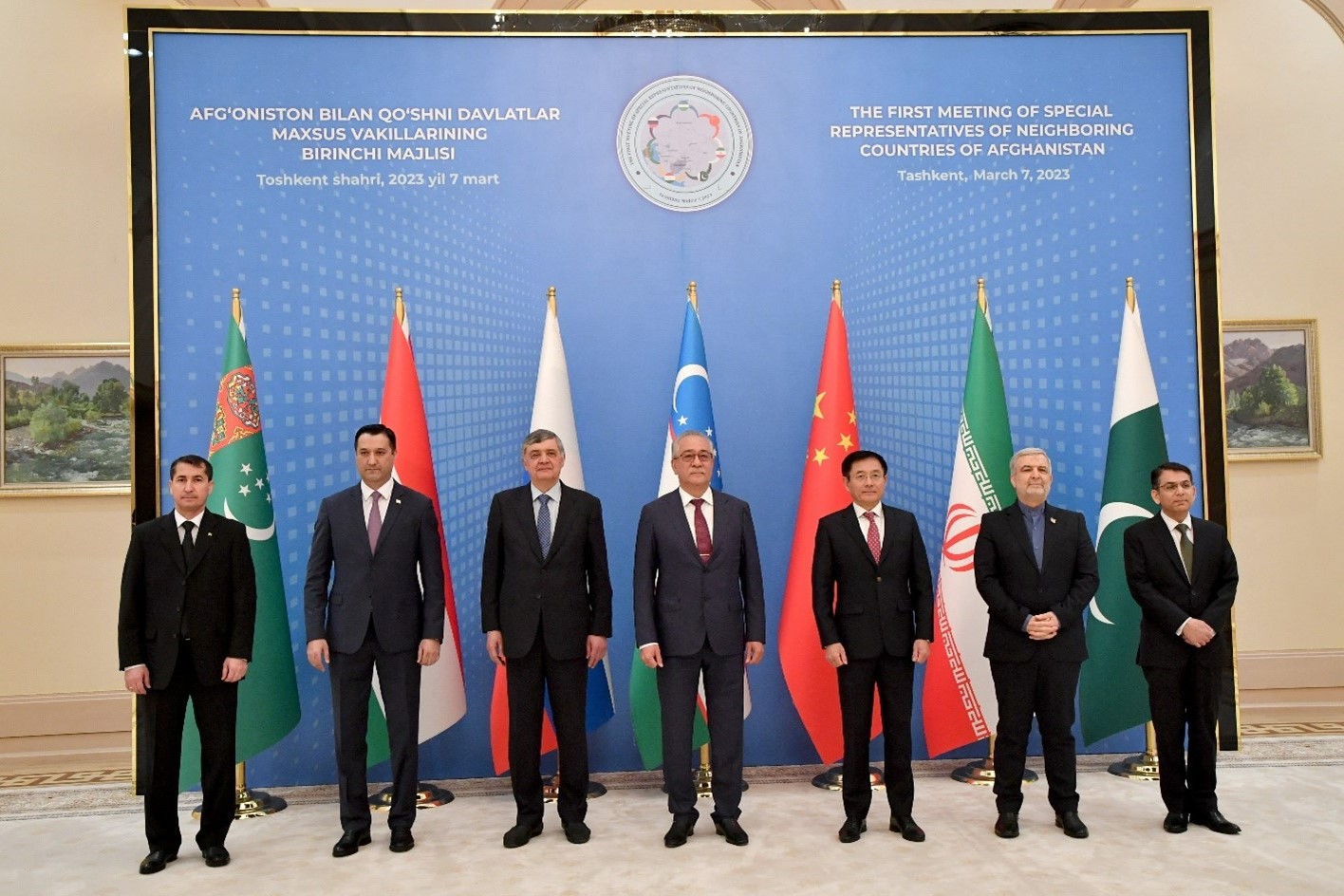This past week, Central Asian states attended conferences in Tashkent and New Delhi to discuss collective strategies toward Afghanistan, China called on the United States to unfreeze Afghan assets, and Iran and Uzbekistan diplomats engaged in dialogue concerning Afghanistan.

Representatives of China, Iran, Pakistan, Tajikistan, Turkmenistan, Uzbekistan, and Russia standing for a photo in Tashkent on March 7. Image source: Reuters
In the diplomatic sphere, this last week witnessed many developments in the engagement and dialogue of the Central Asian republics, China, Russia, and other states with interests in Afghanistan. As the Taliban government struggles to maintain security and provide adequate food and economic opportunity for the Afghan citizenry, neighboring states and powers are proactively seeking to help stabilize the country. To this end, two conferences took place on March 7 (Reuters).
The first was an inaugural conference between the five Central Asian republics and India in New Delhi, which will be called the India-Central Asia Joint Working Group on Afghanistan (Astana Times). Representatives of Kazakhstan, Kyrgyzstan, Tajikistan, Turkmenistan, and Uzbekistan were present. Officials from the republics’ United Nations Office on Drugs and Crime and United Nations World Food Program also attended the gathering. The representatives discussed Afghanistan’s security, the collective desire for an inclusive government, and the crisis of food insecurity and women’s education. The member states concurred on the need for closer cooperation with each other and with the United Nations for the procurement and delivery of humanitarian aid to Afghanistan.
The second diplomatic conference on March 7 saw representatives of China, Iran, Pakistan, Tajikistan, Turkmenistan, Uzbekistan, and Russia gather in Tashkent for the inaugural meeting of the “Special Representatives of the Neighboring Countries of Afghanistan” group. The diplomats included Chinese special representative Yue Xiaoyong, Iranian special representative Hassan Kazemi Qomi, Pakistani deputy foreign minister Syed Ahsan Raza Shah, Tajik head of the foreign ministry’s department of strategic studies Vafo Niyatbekzoda, Turkmen deputy foreign minister Vepa Hajiyev, Uzbek special representative Ismatulla Irgashev, and long time Russian envoy to Afghanistan Zamir Kabulov. The primary agenda item was the discussion of the United States’ freeze on the assets of the Central Bank of Afghanistan – numbering upwards of $7 billion. Bringing attention to the humanitarian crisis and looming famine, the states called on the United States to rethink its policy and release the money to be used by the Taliban government to pay salaries of healthcare and educational employees. The member states hope that this format will lead to regular roundtable discussions about Afghanistan (The Express Tribune).
In a similar tone, on Wednesday the deputy representative of China to the United Nations, Geng Shuang, spoke in front of the Security Council about the need for the United States to immediately return the $7 billion of frozen Afghan assets that “belong to the Afghan people and should be used for the Afghan people” (CGTN). He cited the holding of Afghan assets and sanctions levied against the Taliban as a source of the instability and humanitarian crisis gripping Afghanistan.
Lastly, a meeting between the foreign minister of Uzbekistan Bakhtiyor Saidov and the Iranian foreign minister Hossein Amir-Abdollahian took place in Tehran (TOLO News). Uzbekistan and Iran are both closely interested in the stability of Afghanistan. Uzbekistan, despite sometimes tense relations, is the foremost international partner of the Taliban government. Iran has more strained relations with the Taliban, dating back to the near breakout of war between Iran and the first Taliban state in 1998, but is eager to engage economically with Afghanistan. Among the topics discussed by the foreign ministers were economic development, security challenges, and the possibility of an international air corridor.

